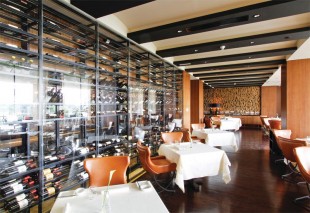

INSIDE AMADOR: Tapas with a twist

Amador uses forward-thinking German techniques and technology to offer cutting-edge cuisine to Abu Dhabi’s residents
Front of house
Amador at Park Rotana Abu Dhabi, which opened on February 14, 2012, is no ordinary restaurant. With an innovative menu that includes dishes like virtual sushi, truffle lollipops and gin-tonic nitros, it pushes the boundaries of dining as we know it.
The restaurant is a joint venture between the hotel and three-star Michelin chef Juan Amador, who was born and raised in Germany to Spanish parents.
He wanted a statement design featuring an oversized tapas bar, wine cellar and sectioned dining areas, so employed the help of LWDesign, who took the interiors from concept to creation. It was Katherine Stealey Tranter who led the project.
“The restaurant brief was described to us as a destination wine bar which was to be linked with a restaurant serving high-end tapas and molecular cuisine,” she explains. “We were aware that it was going to be run by a Michelin chef with Spanish heritage and that a Spanish/German background influenced his food.”
Being the first restaurant in Abu Dhabi to open in collaboration with a Michelin chef, Tranter was eager to create unparalleled wow-factor: “We wanted to enhance that rare experience that can only be found at the greatest restaurants in the world in this restaurant,” she says.
Article continues on next page...
“A Michelin star is not only the ultimate recognition of quality, skill and excellence, it is a sign of ‘rarity’ – something so good that one will rarely get the opportunity to experience it.
“The restaurant has certainly raised the standard for high-end dining in Abu Dhabi, and will hopefully open the door for many more restaurants of this caliber.”
The interiors do indeed reflect the dramatic statement Amador has created with his food, combining traditional building features, such as barrel vaults and beamed ceilings, with contemporary, clean lines.
One of the ‘rarest’ features in the restaurant is the curved bar at which tapas and drinks are served – created to look like a single piece of metal and to complement the clean lines of the restaurant design.
“In Amador we created the statement curved bar and communal drinks table, which initially the client was slightly dubious about, but now it’s in location they really love it.”
Article continues on next page...
Back of house
Behind the scenes was just as much of an exciting challenge to put together as the front of house, Tranter goes on to explain, especially the ‘show kitchen’, which can be viewed through a window from the restaurant’s corridor.
“Lots of restaurants have show kitchens and unless these are thoughtfully laid out and have good quality equipment, they can look cheap and not work efficiently for the chefs,” Tranter says.
“The kitchen consultant needs to be brought in early on the project to ensure all the operational requirements are met. We spent a lot of time at the beginning working with the client and chef to ensure that the show kitchen was carefully integrated into our design. It’s a fine balance to get show kitchens both looking good and being practical.”
The kitchen is slightly different to the ones the team work with in Amador’s other restaurants in Mannheim, Germany, and Bucharest, Romania. There, granite work surfaces add character, but strict UAE health and safety regulations prevent the same being recreated here.
However, there is a lot of equipment the team has brought with them. Jörg Hofmann, corporate chef and outlet manager at Amador AG who was in charge of setting up the Abu Dhabi restaurant, explains: “We have imported a lot of German equipment for the restaurant, including MKN induction cookers, which heat up in just one or two seconds.
We use induction heat in our kitchens because gas is too hot. With gas you get everything cooking in a ring around the outside of your pan, then the thing in the middle is not cooked. There are not many kitchens in the UAE that are cooking with this method.
Article continues on next page...
“That is what we do,” he continues, “we come in and lead the way. We are bringing education. It wouldn’t make sense for us to go below where we are. It’s a German thing.”
Hofmann is also trying to steer the supply chain and is putting pressure on producers to apply for halal certificates to ensure the finest European meat can be imported into the country.
“Importing meat is very complicated. We have to import everything halal. This means that we’ve had to change suppliers. We have gone to our old suppliers and told them to apply for halal licences. France won’t do it – they say that the market is too small, but we’re hoping others will.”
Aside from that, Hofmann is also proud of the specialist equipment that goes into making the Amador dishes so unique.
“The liquid nitrogen was hard to find in this country,” he explains. “We eventually found one in the airport for around €4,000-€5,000, and we refill it every single week.
We also use a dehydrator to create flavoured powders and olives with crunch.
And the only ready-made products we use are Texturas, from Ferran Adria, former head chef of El Bulli. The Vorwerk blender, which heats at the same time as it blends, creates the smoothest creams you can get,” he concludes.